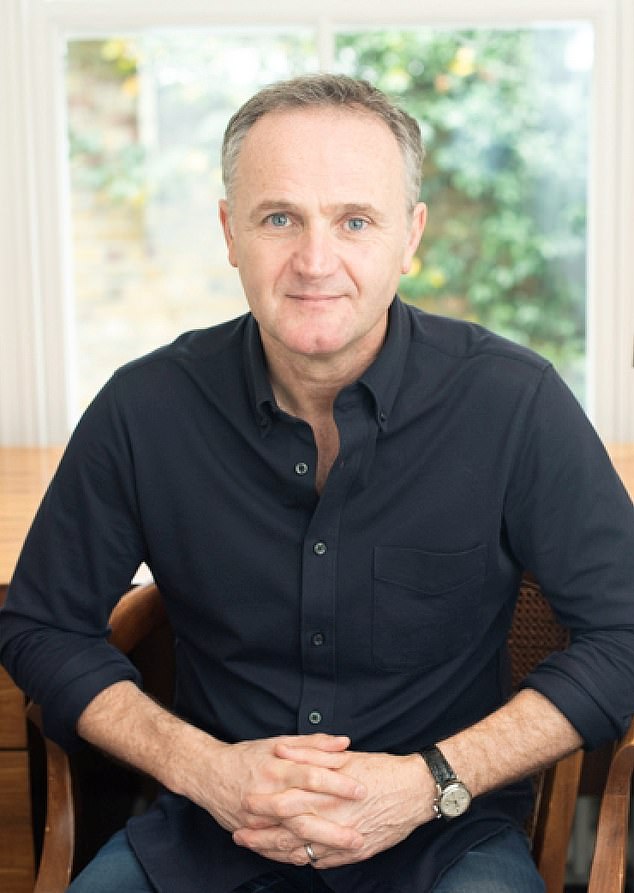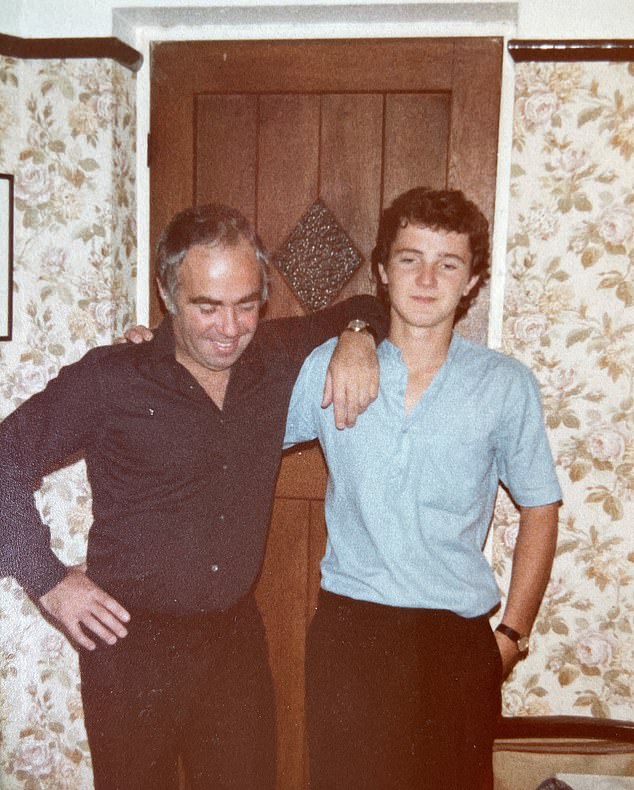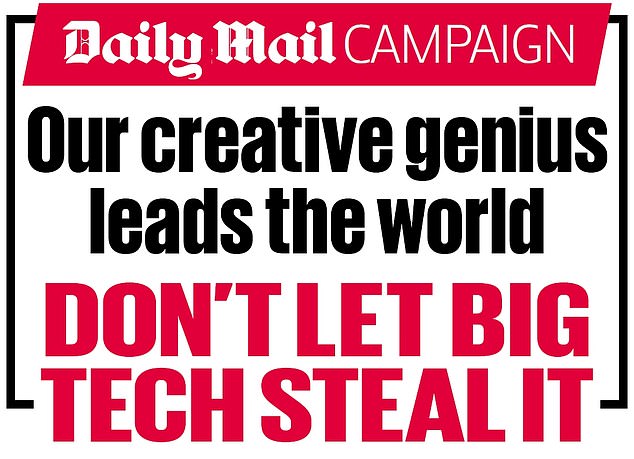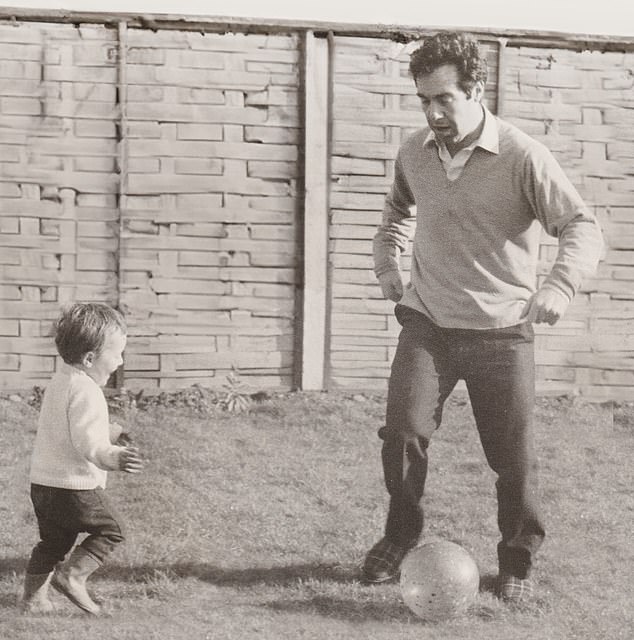A few weeks ago, in this paper’s pages I published a deeply personal account about my 25-year estrangement from my father, Robin.
I shared the emotionally fraught story that began over a petty dispute in 1998 and the cold shadow of estrangement that crept in until, tragically, he died last December without us being reconciled.
The piece was incredibly important to me and I was determined to stop it being copied, so I placed my copyright – ©RobMcGibbon – at the foot of the article in the hope of deterring thieves.
As an interviewer of celebrities for nearly 40 years, I am familiar with my work being ‘aggregated’ by others without permission, so I wanted to retain some control.
But within hours of my ‘estrangement hell’ being published in print and online on Mail+, it had been stolen. Was it by an individual – a journalist, perhaps – helping themselves to my work? No. It was Artificial Intelligence, or AI, and a very 21st-century version of copyright theft.
On the very morning my feature appeared online, a YouTube channel called The World News published a 14-minute-long retelling of my piece, narrated by a female robot. It seemed Artificial Intelligence had got hold of my article from behind the Mail’s online paywall, swallowed it and then spat it out again. It was sickening.
For today’s purposes, I’m naming the robot narrator Laverna, after the mythological Roman goddess of thievery, deception and gain. Laverna’s delivery of my heartfelt story sounded like the directions you get from a sat-nav – but with less emotion.
It was an upsetting experience to listen to a devastating part of my life being dictated with dead-pan disdain by an automaton that has scraped it from the internet.

Rob McGibbon (pictured): A few weeks ago, in this paper’s pages I published a deeply personal account about my 25-year estrangement from my father, Robin

Emotional: Rob McGibbon wrote about the breakdown of his relationship with his father
To add insult to injury, two precious childhood photographs of me with my dad – again copyrighted for single use in the Mail – were used as a rolling, zoom-in-zoom-out montage.
There I was, as a three-year-old playing football with him, while a robot mechanically told our grim story.
But then things got even worse. While Laverna had followed the structure of my piece, all 1,800 words of it, she had re-written my text and created factual errors.
My then-girlfriend was suddenly my ‘fiancée’ and my father-in-law was, bizarrely, ‘identical’ to my estranged father, as opposed to an ‘identikit’ grandfather to my son. More worryingly, it referred to our feud as ‘violent’, when I had written ‘vicious’.
Most insulting of all, however, was that in the AI version of my work, Laverna had pointedly decided not to mention my name or the copyright notice itself.
The mystery still remains: how did this video come into existence? Was it the ‘work’ of an AI-powered scraper, programmed to extract data from across websites, then robotically retell it?
Would AI be intelligent enough to avoid broadcasting a copyright tag line in its stolen work? Surely some human hand is at play somewhere along the grubby line from theft to publication.
Either way, the entire video was interjected with multiple video adverts for a bowel medication. So, presumably, money was being made for someone, somewhere.

The Mail’s campaign seeks to halt the Labour Government’s plan to allow Big Tech companies to help themselves to creative works unless copyright holders register an opt-out
The World News channel had 23,400 subscribers and posted 16,000 videos during the past 13 years, with a total of 13million views. Imagine how the advertising revenue adds up.
All of which brings me to YouTube – owned by mega-rich Google – and my fight after it broadcast the piece for my copyright to be recognised. A fight that turned out to be an object lesson in the struggle that awaits anyone who wants to stop their work being pillaged by AI.
Essentially, it falls to you to make all the running, and it’s a dispiriting circular race.
My initial complaint to the YouTube/Google press office yielded a cop-out in the form of a standard statement: ‘YouTube does not mediate copyright claims – it is between the parties involved,’ it declared. How convenient.
The World News channel had no website or contact details, so that was a non-starter. I took my challenge to the next level.
YouTube/Google told me to file a ‘copyright takedown claim’. This fiddly form requires you to submit personal data to Google. My desire went cold when it insisted on having my mobile number in order to activate the complaint. Why do they need that, I wonder?
A week or so later, I suddenly got an email from Google saying that The World News had been ‘terminated’. By some coincidence, it had been banned for ‘violation of Spam policies’, which meant my copyright complaint had been deftly side-stepped.
I wanted to know how many views it had received off the back of my story, and if any income had come from that quack selling its miracle cure for tummy problems. Some hope.

Rob aged around three-years-old playing with his father Robin
While this might be just one article, it sums up the entire hell-scape that awaits if Big Tech gets its evil way with copyright.
The Mail has been at the heart of the battle to halt the Labour Government’s plan to allow Big Tech companies to help themselves to creative works unless copyright holders register an opt-out, a huge burden for freelancers like myself.
Part of this campaign involved amending the Government’s Data Bill to force AI developers to be transparent about the content they exploit.
Unfathomably, last week the Bill passed through Parliament with the transparency clause vetoed by the Labour majority in the Commons. It will soon receive Royal Assent, essentially giving the voracious Goliaths of Silicon Valley free rein to train their AI tools on creative works – think The Beatles’ catalogue – without the need to pay or even ask.
If my experience shows the thankless outcome from challenging one AI video made from one article, what on earth will it be like complaining to Google, Meta or OpenAI after they have bastardised your life’s work into thousands of pieces across millions of unaccountable websites?
This brings me to the final glaring, absurd obfuscation amidst all this, which I believe should become central in the current fight to protect copyright: the giant digital platforms are complicit in this conspiracy.
YouTube takes a cut in advertising revenue generated by all content ‘creators’, so they benefit from the financial exploitation of copyrighted material even when it has been taken without permission. In effect, YouTube is handling stolen goods – in plain sight. It is as bang to rights as any dodgy trader in a street market selling cheap stuff with ‘no questions asked’, wink wink.
For YouTube to absolve itself of all responsibility in the way that it does is ludicrous and should not be tolerated any longer.
Imagine if John Lewis took a cut from a few thousand new independent sellers on its website that openly sold stolen or counterfeit goods, but explained it all away by saying: ‘Well, we aren’t selling anything – it’s the independents,’ despite the fact that their website and sales system is giving them a platform.
In the real world, there’s such a thing as Trading Standards. If you run a physical shop that brazenly sells stolen goods you will be fined or shut down. It’s time similar rules are enforced by Governments on the rogue traders of the virtual space.
AI is going to become the Master Villain in the stealing of copyright. Look what it did with my one article, from behind a paywall. Imagine what it will do to the works of The Beatles or Elton John (who, by the way, last week described the Government as ‘absolute losers’ over its AI plans). It must not win.
©RobMcGibbon!
- Rob McGibbon is the editor of The Chelsea Citizen, the online newspaper for London’s Chelsea area (thechelseacitizen.com).












